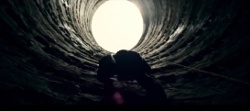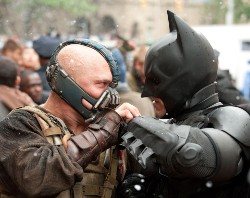BatChrist: Born (and Re-Born) in Hell
 Depending on how you choose to count, there are either three or four Batman resurrections in The Dark Knight Rises.
Depending on how you choose to count, there are either three or four Batman resurrections in The Dark Knight Rises.
 Depending on how you choose to count, there are either three or four Batman resurrections in The Dark Knight Rises.
Depending on how you choose to count, there are either three or four Batman resurrections in The Dark Knight Rises.
 Christopher Nolan’s The Dark Knight Rises is an incredibly ballsy movie. I don’t mean its scope and ambition, both of which are indeed impressive. I mean the audacity of choices that could have easily backfired: following Heath Ledger’s nuanced, razor-sharp Joker with the nearly blank thug Bane; recycling Batman Begins’ sinister plot, doomsday machine, and League of Shadows; inserting teenage-boy masturbation fantasy Catwoman into a universe largely devoid of sex appeal and camp (and non-Rachel Dawes women, period); crafting a lengthy, convoluted first act made even less comprehensible because of the sound design and score; and relegating Batman to captivity of one sort or another for the vast majority of the movie’s first 115 minutes.
Christopher Nolan’s The Dark Knight Rises is an incredibly ballsy movie. I don’t mean its scope and ambition, both of which are indeed impressive. I mean the audacity of choices that could have easily backfired: following Heath Ledger’s nuanced, razor-sharp Joker with the nearly blank thug Bane; recycling Batman Begins’ sinister plot, doomsday machine, and League of Shadows; inserting teenage-boy masturbation fantasy Catwoman into a universe largely devoid of sex appeal and camp (and non-Rachel Dawes women, period); crafting a lengthy, convoluted first act made even less comprehensible because of the sound design and score; and relegating Batman to captivity of one sort or another for the vast majority of the movie’s first 115 minutes.
 I’m starting to get worried about The Dark Knight.
I’m starting to get worried about The Dark Knight.
In Batman Begins, Christopher Nolan uses the superhero mythology to create an epic study of ethics, evil, fear, and justice. It’s a bracing, dark, provocative, and serious work that at last transcends the juvenile roots of the comic-book genre. It’s not just the best superhero movie ever made, but likely also the best mainstream film of 2005.